| |
|
|
CALIFORNIA DARNER
Rhionaeshna
californica
|
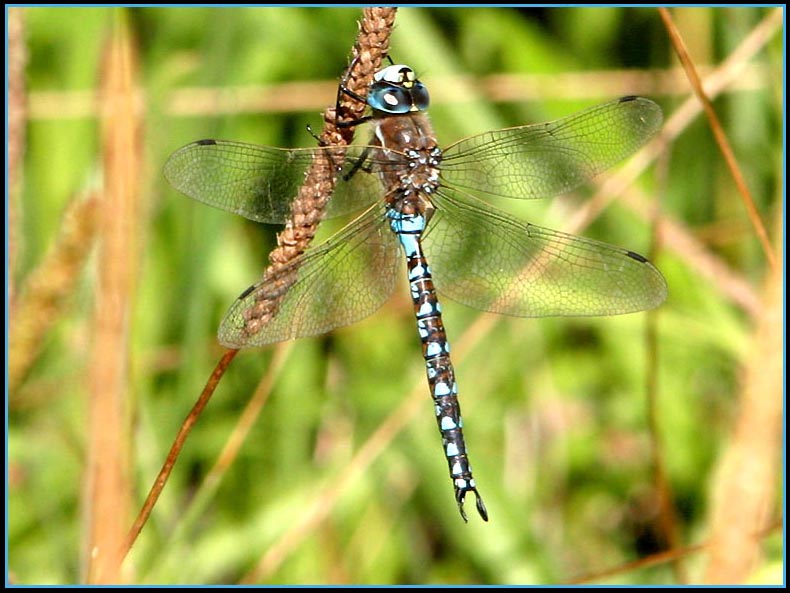
California Darner is a widespread darner from British Columbia to Baja
(Manolis 2003). Until 2007, there was but one MTY record: the one shown
above, at the Carmel River mouth on 7 July 2006. What is more
remarkable about the story is that this was the very first darner that
I ever found perched in MTY; it is my very first darner photographed in
MTY; and at the time I assumed it was a Blue-eyed Darner. I actually
found and photographed a perched Blue-eyed Darner about a half-hour
later on the same date and place (that photo is below). I didn't
realize that two species were involved until examining the photographs
side-by-side later that week. first three photos
this
page 7 July 2006 Carmel
River mouth
|
These two shots provide a side-by-side
comparison of male California
Darner (left) and male Blue-eyed Darner (right).
Points to compare
include:
- California Darner is slimmer and does not have
the 'chunky' thorax of Blue-eyed
- California Darner lacks short blue stripes on
top of the thorax which are
shown by Blue-eyed
- the eyes of California Darner are darker
gray-blue than the sky-blue eyes
of Blue-eyed
- the twin blue dots on the final abdominal
segment are close together, almost
touching, on California; these are widely separated on Blue-eyed
- the terminal appendages are quite different:
California has a single cerci
[better seen in the photo at top of this page] while Blue-eyed has
cerci
that are forked, with the upper fork longer than the bottom fork [best
shown on the Blue-eyed
Darner page, or in Manolis 2003]
|
| |
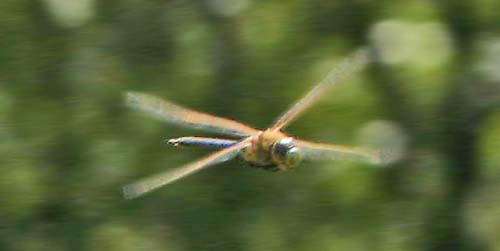 In 2007, knowing that
California Darner was the first darner of the spring in much of
California, I went looking for it in March. Starting on 18 March 2007,
I saw small dark mosaic darners in flight almost daily at Carmel R.
mouth but was unable to confirm identification until I managed a flight
shot on 23 March (right; lack of stripes atop the thorax among other
things). In 2007, knowing that
California Darner was the first darner of the spring in much of
California, I went looking for it in March. Starting on 18 March 2007,
I saw small dark mosaic darners in flight almost daily at Carmel R.
mouth but was unable to confirm identification until I managed a flight
shot on 23 March (right; lack of stripes atop the thorax among other
things). |
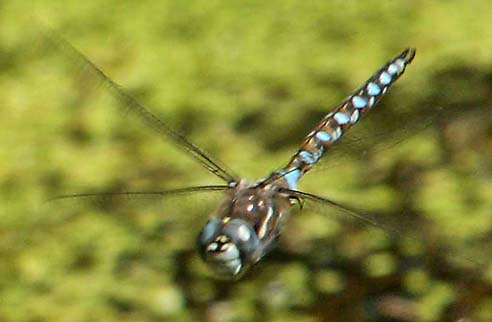 |
A few weeks later (3 Apr) I managed this
flight shot at Laguna Grande park in Seaside. Note again the unmarked
brown back, the simple cerci, the position of the final blue dot on the
abdomen, and the darkish-blue eyes (not bright blue).
On 26 March another male at Laguna Grande
park that perched nicely for photos (below).
|
|
|
|
| California Darner averages decidedly smaller than
other MTY mosaic darners, and has a shorter abdomen (ratio of
thorax:abdomen is about 2:1; about 3:1 in other similar species). These
proportions can be seen in flight, given decent views, and it always
looks small and dark. All the features mentioned above apply to these
photos (above & below). On the second shot below, note the little
tubercle on the underside of abdominal segment 1 that identifies this
darner as a member of the genus Rhionaeshna. |
|
|
|
|
| Females are seen much less often. Steve Rovell
found this teneral darner fluttering in trail-side grass at Frog Pond
Nature Area, Del Rey Oaks, on 4 Apr (below). It is brown and yellow,
like a female (although I do not know what teneral males are like).
Points to notice include the unmarked brown back, brown pterostigma,
the shape of the front side stripe (tapers to a point at the upper
end), the black line across the face, and the very broad shaft and
'legs' to the 'T-spot' at the top of the face and in front of the eyes.
|
|
|
|
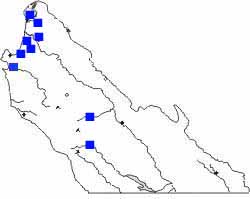 The map shows the
some locales
from which
California Darner is currently known. We expect
it will be found
elsewhere, and perhaps widely. Sites range from coastal marshes and
ponds (Carmel R. mouth, Laguna Grande, Moonglow Dairy) to foothill
rivers (Arroyo Seco & upper San Antonio). The map shows the
some locales
from which
California Darner is currently known. We expect
it will be found
elsewhere, and perhaps widely. Sites range from coastal marshes and
ponds (Carmel R. mouth, Laguna Grande, Moonglow Dairy) to foothill
rivers (Arroyo Seco & upper San Antonio).
MTY flight dates range from 18 March to 7
July. Elsewhere in California,
the flight season is March into August (Manolis 2003).
|
|
I've shown many shots of California
Darner, but here
is the first one reproduced again, at full-frame, so you
can see
the
habitat in which the darner was perched. Note how hard it can be
to
spot a perched darner before it flies.
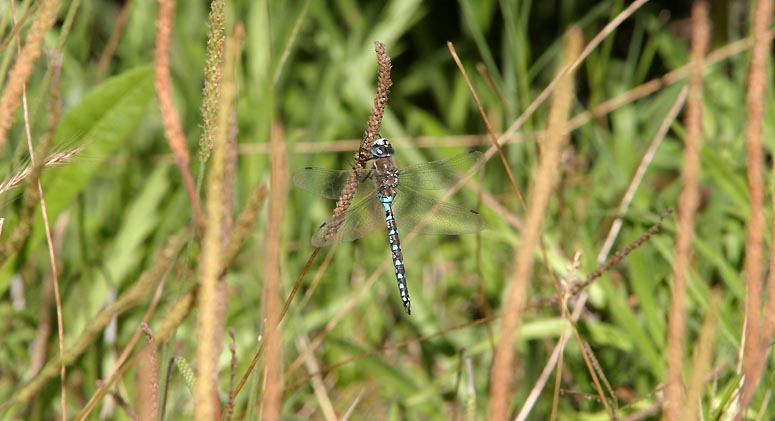
|
|
Literature cited:
- Manolis, T. 2003. Dragonflies and Damselflies of
California. Univ. of
Calif.
Press, Berkeley.
Web resources:
Major identification web sites with much information on California
odes include:
For sites with excellent photos to compare for identification or to
simply
enjoy, see:
Many of these sites have links to other useful pages. Kathy Biggs's
site
is particularly useful in her selection of links. |
|
All photos © Don Roberson 2007,
except the teneral © Steve Rovell, used with permission
TOP
|
|
|
Page created 9 Oct 2006,
revised 5 Apr 2007
|
|
|
|
|


 In 2007, knowing that
California Darner was the first darner of the spring in much of
California, I went looking for it in March. Starting on 18 March 2007,
I saw small dark mosaic darners in flight almost daily at Carmel R.
mouth but was unable to confirm identification until I managed a flight
shot on 23 March (right; lack of stripes atop the thorax among other
things).
In 2007, knowing that
California Darner was the first darner of the spring in much of
California, I went looking for it in March. Starting on 18 March 2007,
I saw small dark mosaic darners in flight almost daily at Carmel R.
mouth but was unable to confirm identification until I managed a flight
shot on 23 March (right; lack of stripes atop the thorax among other
things). 
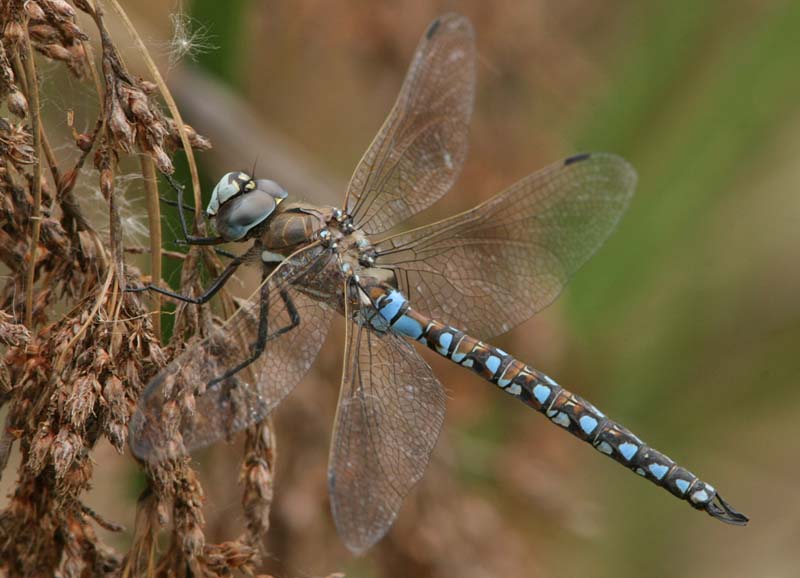
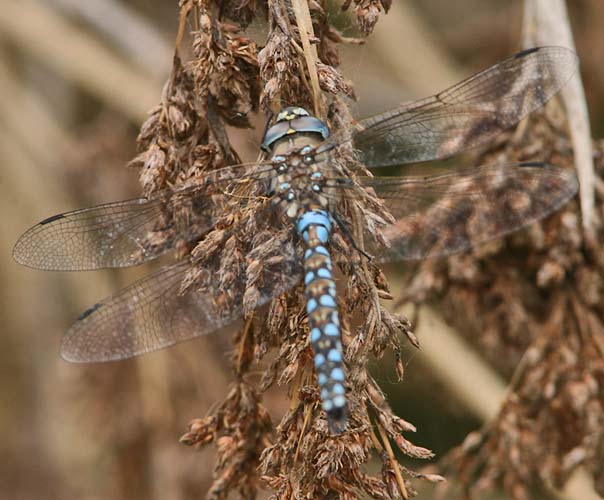
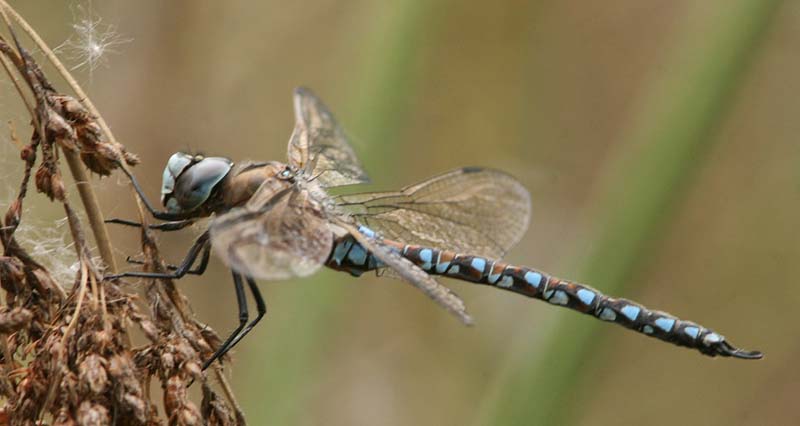
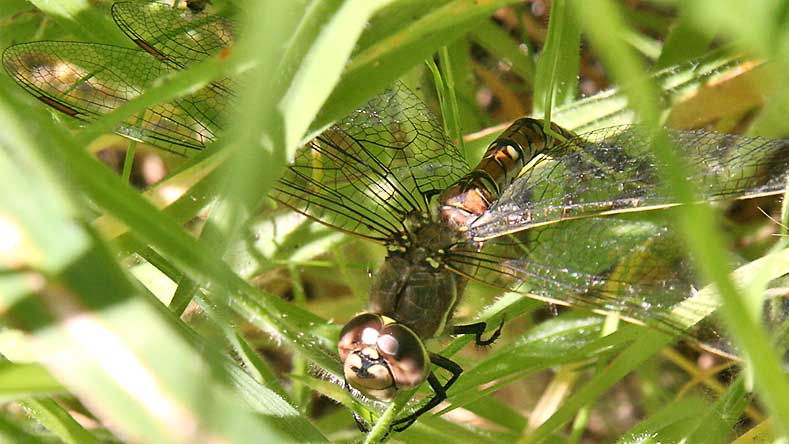
 The map shows the
some locales
from which
California Darner is currently known. We expect
it will be found
elsewhere, and perhaps widely. Sites range from coastal marshes and
ponds (Carmel R. mouth, Laguna Grande, Moonglow Dairy) to foothill
rivers (Arroyo Seco & upper San Antonio).
The map shows the
some locales
from which
California Darner is currently known. We expect
it will be found
elsewhere, and perhaps widely. Sites range from coastal marshes and
ponds (Carmel R. mouth, Laguna Grande, Moonglow Dairy) to foothill
rivers (Arroyo Seco & upper San Antonio).